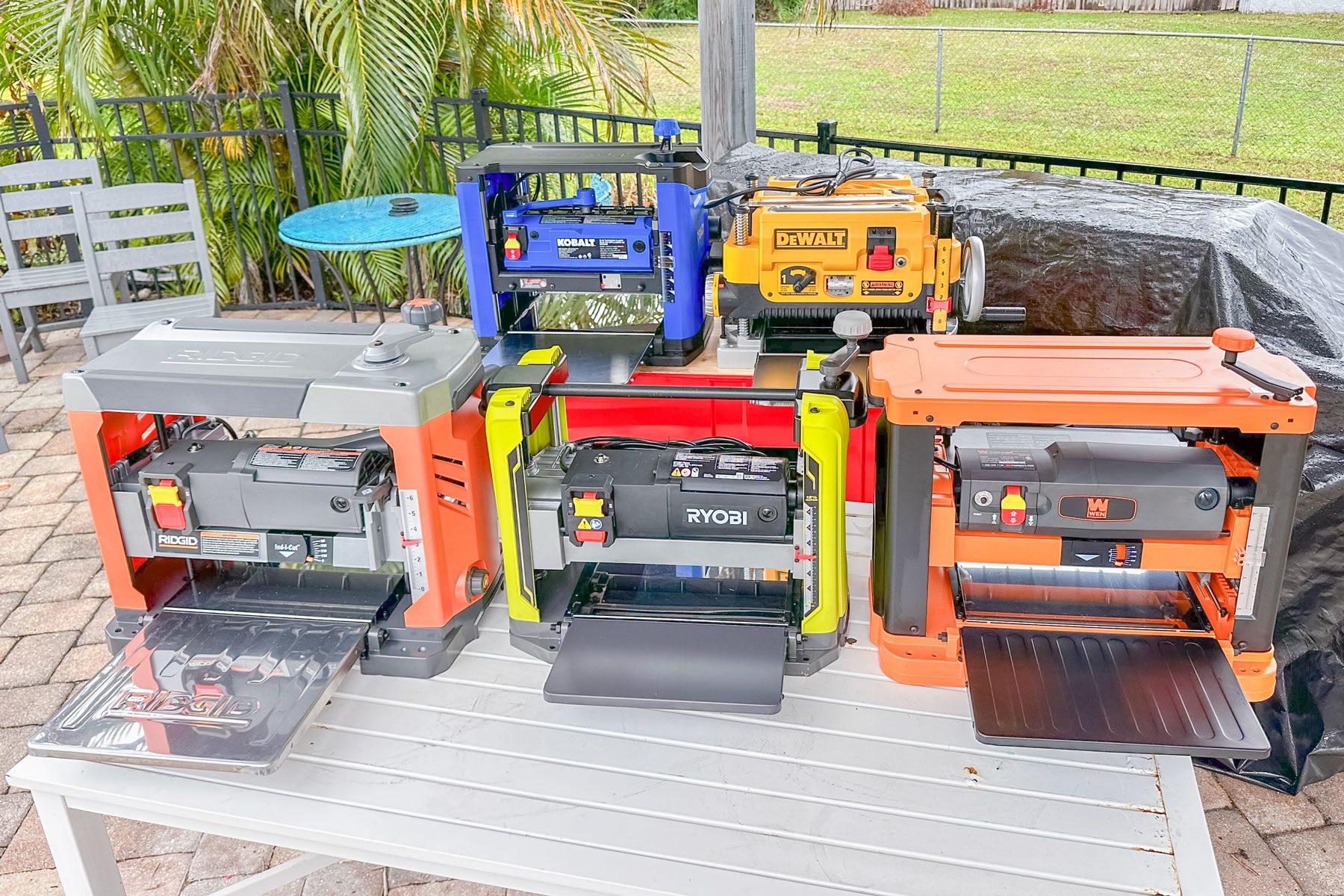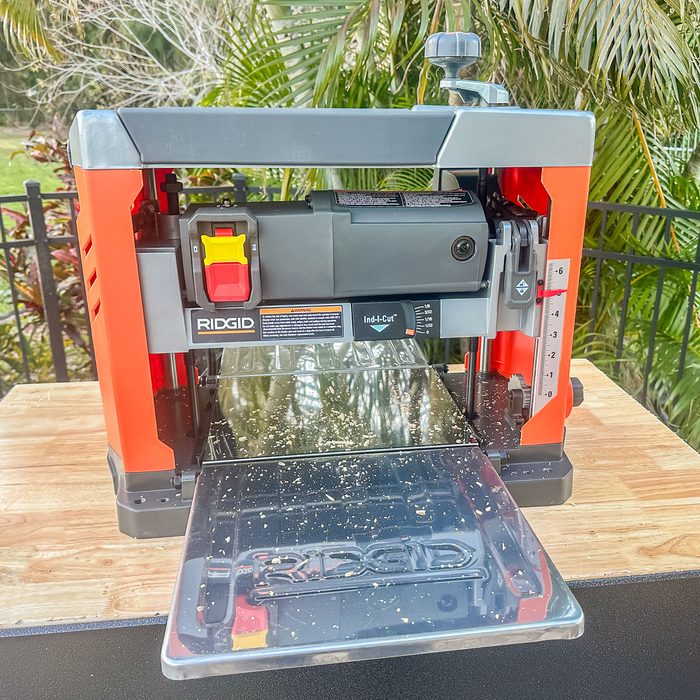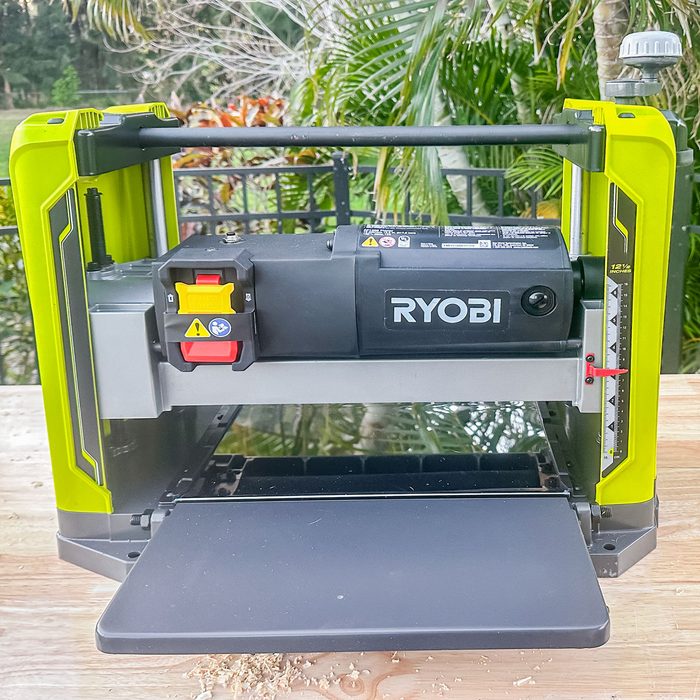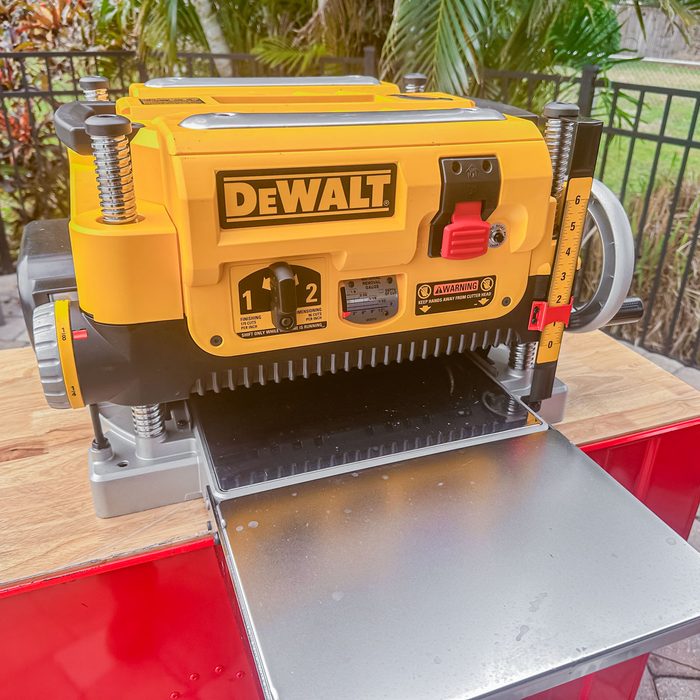Here are the three best benchtop planers for your workshop, according to a lifelong woodworker and other industry pros.
Our editors and experts handpick every product we feature. We may earn a commission from your purchases.Learn more.


Here are the three best benchtop planers for your workshop, according to a lifelong woodworker and other industry pros.
Our editors and experts handpick every product we feature. We may earn a commission from your purchases.Learn more.

Pros:
Cons:
The best benchtop planer leaves your wood with a smooth, even finish and is easy to use and transport. The Ridgid planer checks all of these boxes and then some. It features a robust 15-amp motor and a three-blade cutter head with quick-changing, dual-edge blades for a smooth finish.
It also has a chip and dust removal system to keep both your workspace and the planer’s motor free from sawdust. Better yet, it’s easy to setup, adjust and transport.
Product tester Pamela Bondurant tested this benchtop planer and named it the best overall because of its portability and price point. She also liked the on-board tool storage and ease of assembly. “It was easy to set up. All I had to do is attach the handle, remove the foam and attach the dust vent,” she explains.

During testing, Bondurant gave this planer high marks for its performance, noting that it did not bog down and left a smooth, even finish. Her only complaint was that finding the depth cutter ball proved slightly challenging. “It has a depth cutter, but it’s just a ball,” she explains. “It is a little tricky to find that, even though it has an arrow pointing to the place on the device where it is.”
Type: Benchtop | Power: 15 amps | Number of cutting blades: 3 | Cutterhead type: Straight knife | Weight: 72.88 pounds

Pros:
Cons:
The Ryobi benchtop planer is a great option for those looking for an entry level unit. In spite of its no frills, minimalist design and budget friendly price tag, this planer performed well during testing. It never bogged down and our tester was impressed by the overall finish on each piece of wood.

While the Ryobi planer was able to easily cut through the wood, Bondurant did find some inaccuracies. “It does not have a depth gauge and the units on the side are a little inaccurate,” she says. “But of course they can be adjusted.” Overall, Bondurant found the cuts to be off by one-eighth of an inch, but determined it wasn’t the end of the world and the planer was more than capable of getting the job done.
Type: Benchtop | Power: 15 amps | Number of cutting blades: 2 | Cutterhead type: Straight knife | Weight: 73 pounds

Pros:
Cons:
If you prefer to invest in premium equipment, the DeWalt thickness planer is the best benchtop planer your money can buy. “It’s the best planer I tested,” raves Bondurant, who adds that the high price point and heft are the only things that kept this planer out of the top spot.

Better equipment also means better performance. During testing, Bondurant especially appreciated the DeWalt planer’s depth gauge, which spans the entire width of the planer.
“This means your board will hit it so that you can see how much wood you are going to remove,” she explains. “Most planers only have a little ball bearing that you must hit to see the depth of the cut.” She was especially impressed when the planer cut four feet of board in five seconds, which is faster than advertised. And once it was cut, Bondurant called the finish “beautiful.”
Besides the heavy weight of the DeWalt planer, Bondurant’s only complaint involves the crank. “The crank is sometimes hard to turn, but then gets a little easier,” she says.

Bondurant was pleased with the Kobalt’s performance. “This machine is very easy to turn, the locking mechanism is easy to use and the depth gauge is fairly accurate,” she says. “It definitely has a coarse cut but leaves a nice finish on a two-by-six piece of pine.”

WEN Three-Blade Benchtop Thickness Planer
The WEN planer was the most economical planer we tested. While it certainly got the job done, Bondurant didn’t like the complicated setup and short warranty.
According to DeWalt Product Manager Johnny Hopkins, you should base you purchase on the overall jobs you’ll be working on. “Blade type, cutting capacity and in/out feed support are all important to look out for,” he explains.
“When buying a benchtop planer, homeowners should prioritize cutterhead type (straight, helical or spiral), planning width, depth of cut accuracy and dust collection capabilities for smooth, parallel cuts and a clean workspace,” Landry adds.
To select the best benchtop planers, we began by researching a wide range of models, considering factors such as motor power, number of cutting blades, cutterhead type and portability. We then consulted with woodworking experts to understand the key considerations for hobbyists and professionals alike.
After narrowing down our list, we tested five different benchtop planers. For the sake of consistency, we performed the same tests on each tool using a selection of one-by-twelve boards, two-by-four and two-by-six pine and fir boards. Bondurant also used one-by-eight planks of oak for hardwood testing.
During testing, we paid particular attention to the overall performance, noting whether or not the planer bogged down during use, the quality of the materials and the finish left on each piece of cut wood.
“A benchtop planer is a milling machine used to reduce the thickness of a wood piece,” explains DeWalt Product Manager Johnny Hopkins. “It is used for projects like dimensioning rough lumber, furniture pieces and cabinetry, where you need uniform dimensions and or a flat surface.”
That depends. According to Jared Landry, an expert handyman for Frontdoor, yes. “While planing prepares the surface, sanding is sometimes needed afterwards, especially for show surfaces, to smooth out any imperfections left by the planer and ensure a smooth, even surface,” he says.
On the other hand, Hopkins argues that it’s a matter of personal preference. “If the user needs a smoother surface than provided by the planer, then yes, you should sand after planing.”
“A typical benchtop planer can remove one-sixteenth to one-eighth of an inch of wood per pass, but this can vary based on the type of wood, desired thickness and the planer’s capabilities,” says Landry.
We used a combination of in-depth research, hands-on experience and first-hand knowledge to select the best benchtop planers on the market. Our primary product tester for this piece, Pamela Bondurant, is a lifelong woodworker with experience in various trades. She personally tested five benchtop planers for this guide.
We also consulted Jared Landry, an expert handyman for Frontdoor, an all-in-one app and service that connects homeowners to skilled tradespeople via virtual chat to provide guidance on home repair and maintenance issues. DeWalt Product Manager Johnny Hopkins contributed expertise to this guide as well.